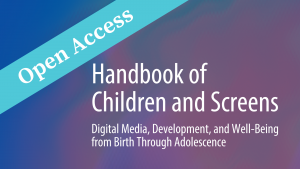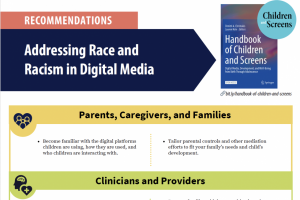
Young people’s digital experiences play a significant role in shaping their development and well-being. While the extent to which these effects cause harm is still debated, it is becoming clearer that marginalized youth are at increased risk for negative outcomes with digital tech use. This section of “Handbook of Children and Screens: Digital Media, Development, and Well-Being from Birth Through Adolescence,” highlights research exploring why systematic racism exists in tech design, how these biases impact youth of color, and ways to mitigate these risks. The authors for this section of the handbook acknowledge that, in order to fully understand how digital tech impacts youth of color, more robust, standardized tools for measuring digital racism are needed. Moving forward, it is vital for tech companies to include marginalized voices in every aspect of the design process to reduce racial bias at all production levels.
Recommendations [ALL]
The following recommendations are excerpts from the "Race, Racism, and Digital Media" section of the “Handbook of Children and Screens: Digital Media, Development, and Well-Being from Birth Through Adolescence." This open access publication is free to download in full or by individual chapters via the links provided following the recommendations below.
- Learn how patients are using social media.
- Acknowledge youth of color’s lived experiences and expertise.
- Know that online resistance is not risk-free (e.g., stress, cyberattacks).
- Become familiar with how machine learning-based models work for detecting neglect and abuse.
- Understand that racism intersects with other systemic inequities.
- Become familiar with the digital platforms children are using, how they are used, and who children are interacting with.
- Tailor parental controls and other mediation efforts to fit your family’s needs and child’s development.
- Implement social media education in the classroom.
- Educate students about ethical tech design and provide related training (e.g., coding).
- Develop digital literacies around new tech and its influence on social structures and institutions.
- Create opportunities for students to collectively challenge online racism.
- Validate experiences of online racism through curricula highlighting youth of color’s experiences.
- Create fellowships to facilitate youth lived experiences in machine learning design.
- Connect students with community resources and activists.
- Advocate for tech company accountability.
- Seek opportunities to leverage emerging technologies and reimagine a justice-oriented future.
- Understand that racism is systemic and pervasive in American institutions, culture, and society.
- Legislate to protect children’s data online.
- Regulate against racism on digital platforms, including the development and deployment of AI.
- Include youth in the policymaking process.
- Include marginalized youth and field experts in the tech and content design process.
- Reconsider the neutrality of AI technologies and apply a critical race lens to ongoing developments.
- Diversify the technology workforce to include marginalized voices and experts in these topics.
- Acknowledge and elevate the risks tech companies pose for youth.
- Understand that racism intersects with other systemic inequities, and explore the impact of these intersectionalities on digital experiences.
- Be mindful of ethics when choosing research methodologies.
- Include youth, marginalized voices, and field experts in the research process.
- Facilitate interdisciplinary research.
- Provide insight to tech companies that mitigates racism in tech design.
- Explore protective factors that minimize health threats to marginalized youth.
Race, Racism and Digital Media Section Chapters
Introduction to the Section on Race, Racism, and Digital Media
Rob Eschmann, PhD, and Desmond Upton Patton, PhD
Structural Racism in Tech: Social Media Platforms, Algorithmic Bias, and Racist Tech
Safiya U. Noble, PhD, Sarah T. Roberts, PhD,, Matthew Bui, PhD, André Brock, PhD, Olivia Snow, PhD
Is Social Media Increasing Risk for Mental Health Problems Among Youth?: It’s Complicated.
Ran Barzilay, PhD, MD, David Pagliaccio, PhD, Carter J. Funkhouser PhD, Randy P. Auerbach, PhD, ABPP
Online Racism and Its Impact on Children, Adolescents, and Emerging Adults of Color
Brendesha Tynes, PhD, Henry A. Willis, PhD, Ashley Maxie-Moreman, PhD, Stephanie M. Ortiz, PhD, Devin English, PhD
Video Games and Race
Kishonna L. Gray, PhD, Tara McPherson, PhD, Gillian Russell, PhD, Rachel Anderson, MD
Participation of Marginalized Youth in Designing a Machine Learning-based Model to Identify Child Abuse and Neglect
Aviv Y. Landau, PhD, MSW, Hannah Espeleta, PhD, Siva Mathiyazhagan, PhD, MSW, Ashley Blanchard, MD, MS, Paul Heider, PhD, Kenrick Cato, PhD, RN, Rochelle F. Hanson, PhD, Desmond Upton Patton, PhD, MSW, Leslie Lenert, MD, Maxim Topaz, PhD, RN
Radical and Untethered: The Health Benefits of Imagination in Virtual Reality for Black Youth
Courtney D. Cogburn, PhD, Valerie Jones Taylor, PhD, Prema Fillipone, PhD, Oyewole Oyekoya, PhD
Online Resistance: The Past, Present and Future of Challenging Racism with Digital Tools
Robert Eschmann, PhD, Nkemka Anyiwo, PhD, Noor Toraif, PhD, Stephanie M. Ortiz, PhD




